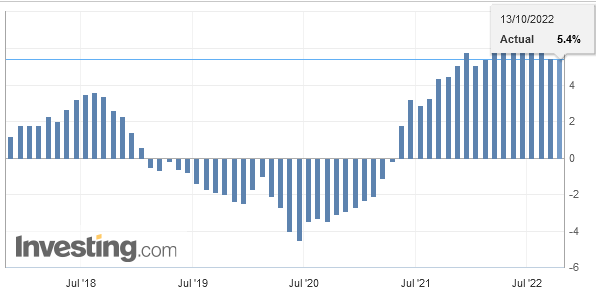Tag Archive: newsletter
College as an Economic and Social Problem: Dealing with the Culture
Jeff Deist recently posed the question “Is College Worth It?” My first thought when I opened the article was that he could have reduced the entire piece to a single word: “no.”
Read More »
Read More »
New World Stage calls for overhaul of UN Security Council
The United Nations' Security Council goal was to ensure the collective security of humanity. Seventy years after its creation the five-member council needs a massive shakeup if it is to address today’s challenges argues Hassan Nafaa, professor of Political Science at Cairo University.
Read More »
Read More »
Everything’s Fixed–Except What’s Broken
Everything's fixed except what's no longer profitable to plunder. Underfunded, ignored, mismanaged by incompetents, it breaks. Everything's fixed--except what's broken. Hmm. Maybe we need to read that again.
Read More »
Read More »
Thomas Jordan: Current challenges to central banks’ independence
In the recent past, the political and economic backdrop has changed dramatically. Inflation is far too high almost everywhere, and central banks are raising their policy interest rates at a time when stocks of government debt are large. In some places, central bank independence is being publicly called into question.
Read More »
Read More »
Swiss Producer and Import Price Index in September 2022: +5.4 percent YoY, +0.2 percent MoM
The Producer and Import Price Index rose in September 2022 by 0.2% compared with the previous month, reaching 109.8 points (December 2020 = 100). In particular, petroleum and natural gas as well as agricultural products saw higher prices.
Read More »
Read More »
The Turkish Way
The Wall Street Journal reported on September 22 that Turkey’s central bank cut that country’s benchmark interest rate to 12 percent from 13 percent, pushing the Turkish lira lower as much as 0.4 percent against the dollar to a new record low after the decision. One US dollar recently bought 18.3866 lira.
Read More »
Read More »
Don’t Be Greedy and Get Some Gold!
SBTV spoke with Dr. Marc Faber, publisher of the Gloom, Boom, and Doom Report, about the risks people, are exposing themselves to when they overlook buying gold by only seeking investments with the biggest gains. "Everybody needs to hold some gold!", says Dr. Marc Faber.
Read More »
Read More »
Charlie Munger Best Frugal Living Tips (Frugal Living)
In this video, I'm going to share some of the best frugal living tips from one of the best investors, Charlie Munger. Learn how to spend less, save more, and invest wisely for your future!
Read More »
Read More »
Was the BOE’s Pivot a Warning of Things to Come?
Alasdair Macleod, Michael Oliver and Dr. Quinton Hennigh return as guests on this week’s program of Turning Hard Times Into Good Times with Jay Taylor.
Read More »
Read More »
Was the BOE’s Pivot a Warning of Things to Come? | Alasdair Macleod, Michael Oliver, Quinton Hennign
Alasdair Macleod, Michael Oliver and Dr. Quinton Hennigh return as guests on this week’s program of Turning Hard Times Into Good Times with Jay Taylor.
On September 28, the Bank of England (BoE) announced it would begin buying the 30-year gilt at a 20-year high yield at above 5% as pensions funds and other institutions were approaching insolvency due to losses on gilt investments. The fear of a liquidity crisis among pension funds caused by...
Read More »
Read More »
Massive Buying Pressure Pushing Gold & Silver Higher | Keith Weiner
Special Coverage from the New Orleans Investment Conference - Keith Weiner, CEO of Monetary Metals discuss how massive buying pressure is pushing gold & silver higher, QE in England, a FED Pivot, the USD & more.
Guest: Keith Weiner, CEO
Company: Monetary Metals
Twitter: @RealKeithWeiner
Youtube: @Monetary Metals
Brought to you by:
Victoria Gold Corp. (TSX: VGCX)
#gold #silver
DEUTSCHE GOLDMESSE
November 18 & 19, 2022 in...
Read More »
Read More »
A Massive Systemic Shock Is Coming & The Fed Is Actively Courting It | Marc Faber
WORRIED ABOUT THE MARKETS? SCHEDULE YOUR FREE PORTFOLIO REVIEW with Wealthion's endorsed financial advisors at https://www.wealthion.com
Dr Marc Faber returns to the program to provide his latest macro outlook. Marc is a PhD in economics, author and long-time Editor & Publisher of the Gloom Boom Doom Report.
It's quite pessimistic, as Marc sees the combination of 'too much debt', asset bubbles, a moribund global economy, and smoldering social...
Read More »
Read More »
Do you have your CPI trading playbook ready for tomorrow’s big release?
In this video, I outline the bias, risk and targets through the key US CPI data tomorrow.
The US CPI will be released tomorrow at 8:30 AM. Adam has put up a post outlining the expectations for that pivotal release. You can find it HERE.
In addition to know the expectations, it is important for traders to understand the bias, the potential bias shifts (i.e. from bullish to bearish or bearish to bullish), the risks and the targets that you might...
Read More »
Read More »
[SILVER] “Why Am Doubling Down Here” – Alasdair Macleod | Silver Price
[SILVER] "Why Am Doubling Down Here" - Alasdair Macleod | Silver Price
Please Subscribe: https://www.youtube.com/c/INVESTOSITE
▶▶Footage licensed through Video Block & Flimpac
#alasdairmacleod #gold #investosite
"Music: Licensed"
"Video Footage: Canva & StoryBlocks"
------------------------------------
Special thanks to
Alasdair Macleod
----------------------------------------
#gold #silver #alasdairmacleod...
Read More »
Read More »
Es ESKALIERT immer mehr: Krimbrücke, Nordstream – droht eine False Flag Aktion?
Die Ereignisse überschlagen sich und statt De-Eskalation sehen wir immer mehr Eskalation: Anschlag auf Nord Stream, Angriff auf die Krimbrücke, Vergeltungsangriffe auf Kiev, die Forderung nach einem atomaren Präventivschlag usw. Heute stellen wir die Frage: Cui bono? Wem nutzt es und wer hat die Nord Stream Pipelines gesprengt?
YouTube Community-Umfrage, wer hat die Pipelines sabotiert?...
Read More »
Read More »
Why You Should Prepare for a Crash Landing – Robert Kiyosaki, Richard Duncan
The Fed is now hiking interest rates very aggressively AND destroying $95 billion every month through Quantitative Tightening. Today’s guest explains how the Fed plans to continue hiking rates and destroying hundreds of billions of dollars until it throws millions of Americans out of work and wipes out trillions of dollars of wealth in order to bring the inflation rate back down to its 2% inflation target.
Richard Duncan, author of “The Money...
Read More »
Read More »
Alasdair Macleod – Was the BOE’s Pivot a Warning of Things to Come?
Alasdair Macleod, a Senior Fellow at the GoldMoney Foundation and Head of Research at Goldmoney, shares his views on the BoE’s pivot and what it could point to.
Read More »
Read More »
“Größter Crash seit 70 Jahren”
► Den Kanal von Sebastian findest du hier: https://www.youtube.com/c/Hellinvestiert
An der Börse sagt man gerne, dass sich Profis um Anleihen kümmern und alle anderen um Aktien. Ich habe mir daher einen Anleihen-Experten als Vertretung eingeladen. Sebastian Hell, bekannt von seinem YouTube-Kanal "hell-investiert", spricht heute über den größten Crash seit 70 Jahren und wie man davon als Anleger profitieren kann.
► Sichere Dir meine...
Read More »
Read More »





















































